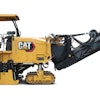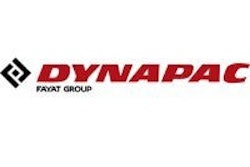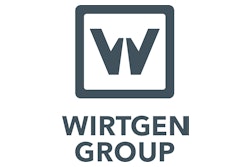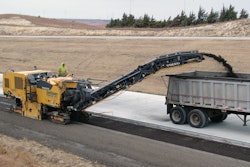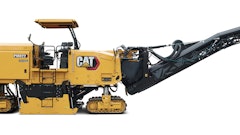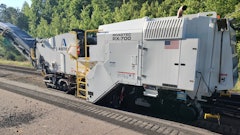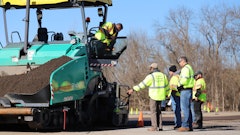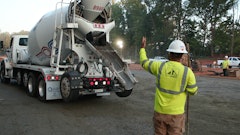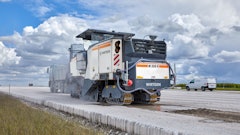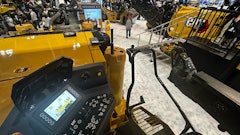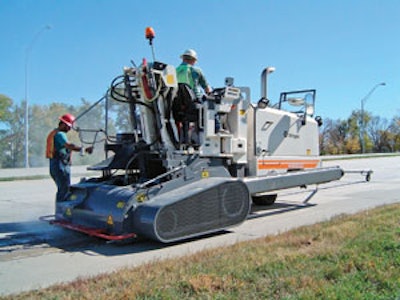
There are a few companies in the industry that offer small and mid-sized milling machines geared toward the commercial contractor. These machines might seem like an out-of-reach investment for some, but on closer examination may prove to be an attainable and profitable venture.
What a mill can do for you
Dedicated mills are efficient cutting machines and can save contractors a lot of time busting up asphalt compared to the alternative methods often used, such as saws, milling attachments, or hammer attachments. The self-loading mills cut additional man hours out of an operation because there is no need for extra machinery to load up and haul away the milled asphalt.
Mills use a plunge cut and leave straight cut edges while an onboard water supply keeps dust down (and teeth cool) for a clean work site that can be paved immediately.
"When you make multiple passes with these milling machines, the cuts match very well so you have a very hard time telling one pass to the next, which is what you're looking for before you pave," says Jeff Wiley, Wirtgen America.
The specific jobs you use your mill for depend a lot on the size machine you have. Commercial size mills in the 600 millimeter (24 inch) to 1300 millimeter (51 inch) range can be used for many jobs you would use a larger mill for, just to a smaller degree. In many instances where you could use a half-lane mill, such as city streets or large parking lots, a commercial mill could be used instead. Commercial mills are also ideal for shoulder widening, utility installation, and curb relief.
Their variable cutting depth allows you to mill out up to 12 inches deep in order to correct base problems while doing patch work, or skim a few inches off the top of the surface for an overlay.
"These small mills are generally designed for small area milling — shoulder work, repair work, stuff like that. But it's very common that a commercial contractor who owns a 48-inch or 51-inch mill bids a parking lot that needs a resurface. He may not be cutting 84 inches, but he's cutting 51," says John Hood, Marini.
Smaller milling machines, such as the 350 millimeter (14 inch) and 500 millimeter (20 inch) sizes, are used primarily for doing detail work, such as milling around manholes, doing work in tight corners, or working on bridge decks and in parking garages. A 350 millimeter mill will cut 3 or 4 inches deep, while the 500 millimeter machines generally cut twice as deep. These small mills are usually not self-loading, but some companies offer conveyor options for these machines.
"If you're using this size machine on a job where you also have a big mill, you would use the smaller machine to do the detail work and the utility cuts," says Phil Winning, Dynapac. "Normally the big mill has to lift over manhole covers and the other things, so when he lifts that already will be cut."
Are you ready for a mill?
Money is probably foremost on your mind when decided whether to purchase a mill.
Machine prices across the industry are relatively similar. A one meter mill will cost about $300,000, while a machine with a 24-inch mill head, such as the 600 millimeter model, is in the $185,000 to $220,000 range. On the smallest end of milling machines, the 350-millimeter models, you could expect to pay between $85,000 and $105,000.
Another factor, which might often get overlooked in an initial decision review, is transportation.
"When you're talking about half-lane mills that weight 60,000 or 80,000 pounds, that's a huge deal," says Hood. "These commercial mills, as a general rule, weigh 40,000 pounds. They can be legal loads and haul on pretty much any standard low-boy trailer. So that's a big factor to that contractor."
Another issue to look at is the availability of milling services in your area.
"One of the biggest things is control," Winning says. "If he's an asphalt contractor and doesn't have a mill, then he depends upon the subcontractor. And if he has a great relationship with a good milling subcontractor who is nearby and can get a fast response from, there is not as much need for him to have a mill. But if he loses some of the control — and then some people just want to have full control of their whole operation — having a mill means they don't have to wait for the subcontractor."
What everything comes down to, however, is money. Would a mill be a viable economic venture for your business? Mills are undoubtedly an expensive investment, and you need to make sure it's going to bring in enough money for you to make a profit. Hood says that it's a big decision to make when you're looking at spending $300,000 on a machine, but if you're spending as low at $40,000 a year on subcontractors for milling, it might be time to explore your options with a milling machine.
"If you're giving someone else that much money, why wouldn't you want to keep that work in house, expand your abilities, and be able to offer more services to the people within your geographical area?" he says.
In addition to scheduling freedom, a mill can also generate dollars for you through rentals to other contractors in your area. Most contractors who rent out a mill do so with their own operator, since knowledgeable operation of a mill is essential to running the machine efficiently and safely. Hood says on average, a one meter mill with an operator is often rented out for $2,000, plus the cost of the move.
A mill can also benefit your bottom line through the milled out asphalt it takes up in the milling process.
"I call it black gold," Wiley says. "Milled out asphalt is excellent material for base. It compacts very well and it also is a material that an asphalt supplier that makes asphalt can take and recycle. They'll recycle 20-30% of that raw material that you just cut back onto new asphalt when they make the mix."


